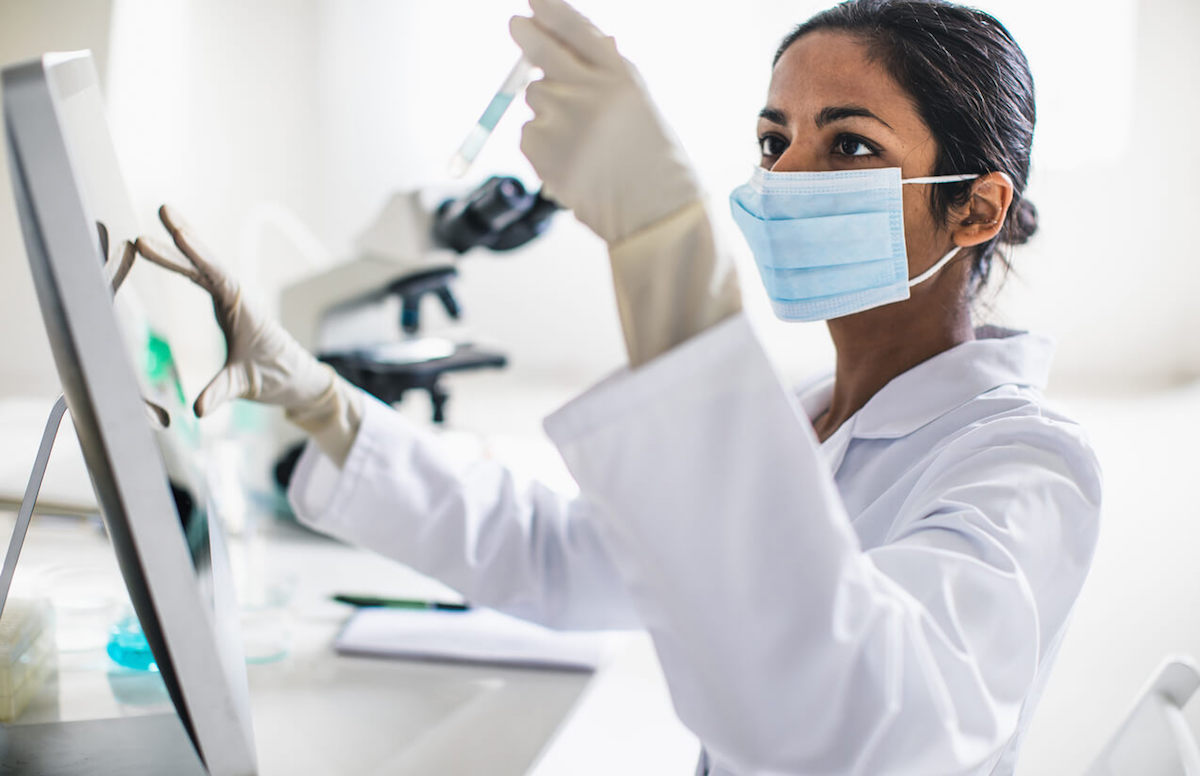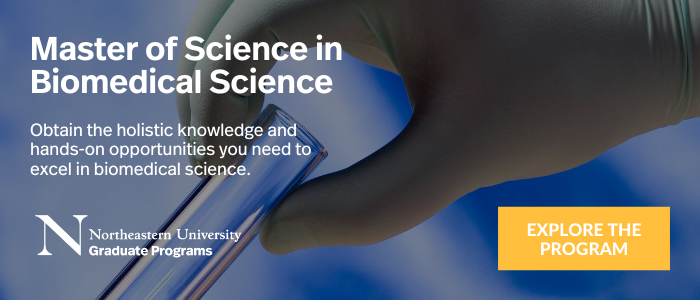If you’ve been thinking about a career in biomedical science, now is the time to act.
According to the U.S. Bureau of Labor Statistics, the medical scientist role is poised to grow by 6 percent from 2019 to 2029—faster than the national average of 4 percent for all jobs. Positions at firms in the pharmaceutical and biotechnology industries often pay six-figure annual salaries, while the median yearly wage for this job across all industries is $90,000.
So what kind of biomedical science skills will help you land the role you want? Scientific research, observation, and analysis are certainly important, but private-sector employers and university research departments also value employees who are effective communicators and are motivated to stay on top of industry trends.
If you’re interested in pursuing or advancing a career in biomedical science, here’s a look at eight key skills that leading employers seek from job candidates.
Advance Your Career with a Master’s in Biomedical Science
Learn how to transform your career in an industry that’s transforming the world.
4 “Hard” Skills for Biomedical Science Careers
1. Research and Observation
The ability to lead and conduct medical research projects is among the most critical skills for biomedical scientists. Success in this role requires an eye for detail, a willingness to ask clear questions and follow-ups, and organizational skills so that research findings and other appropriate materials are in order. The ability to follow directions is also a valuable skill, as research may have to be completed in accordance with U.S. Food and Drug Administration (FDA) regulatory guidelines or the requirements of funding organizations such as the Department of Defense’s Congressionally Directed Medical Research Programs.
Besides completing research, biomedical scientists also benefit from building their engineering design, project planning, design documentation, and team management skills. Since few research projects are done in isolation, these biomedical science skills help ensure that a researcher can complete their work with a team’s assistance and within the scope, budget, and timeline that an organization has set for a project.
2. Project Management
Researchers benefit from building a range of project management skills for scientists—even if project management isn’t a core duty in their day-to-day roles. Core project management skills include collaboration, priority setting, and team leadership. Time management skills also come in handy when a team has to conduct multiple experiments simultaneously or schedule experiments to use lab equipment on a given day and time.
Resource allocation is another valuable project management skill. Academic research tends to have a fixed budget amount, while corporate research often generates a negative cash flow as money is being spent, but no revenue is being generated. Teams also need to balance the amount of work each team member does effectively; too much work contributes to burnout, while too little work eats up the budget.
3. Safe Experimentation
Many research scientists that work in a pharma, biotech, or medical setting conduct experiments in a wet lab, meaning they handle “wet” materials such as chemicals or biological matter. Safe handling of these materials is a must-have skill for work in a laboratory setting. Materials must remain in a pure state, and chemical reactions must be monitored carefully.
Employers will look for biomedical scientists who have worked with blood samples, cell cultures, DNA sequencing, enzyme-linked immunosorbent assay (ELISA), or polymerase chain reaction (PCR) on their resumes. The ability to develop standard operating procedures for these types of experiments is also a valuable skill, as both internal and external audiences (such as clients) will benefit from this information.
4. Data Analysis
For biomedical scientists who work in a “dry lab,” data analysis skills are critical for day-to-day work. In these roles, individuals may create computer models to simulate a chemical reaction within the human body. They may also use computational mathematics to examine an experiment’s results to determine the best compound for a particular drug.
Key skills for data analysis in biomedical science include SQL programming, statistical programming for large data sets using languages such as Python and R, and the development of algorithms for complex machine learning or artificial intelligence. Building data visualization skills and learning to present research findings will also benefit individuals in these roles, as analysts are commonly called upon to explain an experiment’s findings to non-technical audiences.
4 Soft Skills for Biomedical Science Careers
1. Communication
Communication is one of the most important professional skills for scientists. Individuals should feel comfortable explaining complex biomedical concepts in written and oral communication to a range of audiences. Depending on an individual’s role, these audiences could include business leaders within the company, representatives of a regulatory agency such as the U.S. Food and Drug Administration, existing or potential clients, or members of the general public.
In addition, interpersonal communication is a valuable skill in biomedical science. Especially in a corporate setting, researchers work in teams and often engage with other business units, so collaboration is essential. Outside the laboratory setting, biomedical scientists may be called upon to deliver lectures or presentations about their work to industry stakeholders and students. This requires the ability to engage with an in-person or virtual audience and to effectively answer questions in formal sessions or more informal settings such as networking events.
2. Flexibility
Kally Pan, a PhD in genetics and developmental biology, encourages individuals interested in biomedical science careers to keep an open mind during the research process. You may need to change your research question or redesign an experiment based on a literature review of existing research or feedback from the principal investigator leading an experiment.
Flexibility is also an important biomedical science skill because it allows individuals to more effectively balance the fast pace at which science advances with the methodical approach of the research process. Researchers need to be willing to consider how new information, new laboratory tools, new technologies for data analysis, and new best practices for conducting experiments can be incorporated into a project that has likely already been years in the making.
3. Motivation
Whether biomedical scientists work in academia or industry, employers value individuals who are motivated to take initiative and can be trusted to work independently. This can be particularly helpful in the more exploratory stages of research, when experiments are less structured. Researchers who can take initiative and design the next steps of an experiment will be valuable members of the larger team.
A sense of curiosity goes hand in hand with motivation. Because science is constantly changing, researchers should be up to date on the latest developments in the field by reading papers, attending events, or taking advantage of internal professional development opportunities. Employers will likewise look favorably on those who are motivated to seek out this information on their own and bring it to their team’s attention.
4. Persistence
Persistence is a valuable biomedical science skill because research takes time and is full of unknowns. Experiments rarely succeed on the first attempt, and problem-solving skills will help researchers evaluate what may have gone wrong and what new steps or methods they should try next. Experiments also have to continue in the face of disappointing factors such as failing equipment, limited funding, and missed deadlines.
In addition, persistence matters when an experiment has concluded, and research has been published. The scientific method emphasizes scrutiny from one’s peers, so researchers must be prepared to answer tough questions about their work. A willingness to stand firm in the face of criticism is a valuable skill for biomedical scientists.
How Biomedical Science Skills Vary By Career Path
Most of the skills discussed above transfer to a variety of roles in the field of biomedical science. However, certain jobs tend to emphasize or prioritize certain skills based on specific responsibilities or job requirements. Here’s a brief look at how job-specific skills can vary based on a range of biomedical science careers.
- Biomedical scientist: These roles focus primarily on medical research, project management, the use of laboratory equipment, and observation and communication.
- Research fellow: These academic researchers who hold a PhD serve in an independent investigator role. The job may place a greater emphasis on data analysis, literature review, and the publication of peer-reviewed research. Leading lectures and dialogues may also be a key responsibility for individuals in this role.
- Research laboratory manager: Along with conducting experiments and analyzing research data, this role requires individuals to be skilled in two key areas: Training technicians in the correct use of lab equipment and managing the maintenance and repair of equipment when necessary.
- PhD researcher: Individuals in this role are typically conducting doctoral or postdoctoral research. For these roles, skills such as conducting and analyzing research (whether in the lab or field) tend to be more important than overall management skills.
- Principal investigator: These individuals lead the laboratory research process, serving as an advisor to the biomedical scientist conducting the experiments. While these roles are found primarily in an academic setting, large pharma or biotech companies conducting many research projects may also employ a principal investigator.
- Medical writer: These roles emphasize communication skills. Medical writers conduct research with the goal of developing educational or training manuals for a range of audiences, including those both with and without formal medical training.
- Medical sales or marketing managers: These roles also emphasize communication, primarily focusing on an individual company’s drugs or medical devices. Collaboration and leadership are also important skills for individuals in these roles, as they often work within a large team and across business units within a company.
Build Your Biomedical Science Skills at Northeastern
The Master of Science in Biomedical Science program at Northeastern University is designed to help those either entering or currently employed in biomedical science to develop the interdisciplinary skills necessary for a career in science or medicine. The program integrates study across key focal points of modern biomedicine such as human physiology and pathophysiology, pharmacology, biochemistry, and cell biology.
Learn More: What Can You Do With a Master’s in Biomedical Science?
Graduates of the biomedical science program are primarily healthcare professionals who go on to advance in their roles, though some graduates also go on to pursue a PhD in biomedical science. Graduates frequently take on roles as industry scientists and administrators for pharmaceutical and biotechnology firms, academic biomedical researchers, medical writers, science teaching faculty, and clinical laboratory researchers.
Want to learn more? Visit the program page to learn how to develop your biomedical science skills at Northeastern University.







Related Articles
PhD vs. Master’s in Biomedical Science: What’s the Difference?
10 Top Careers in Biomedical Science
What is Medicinal Chemistry?